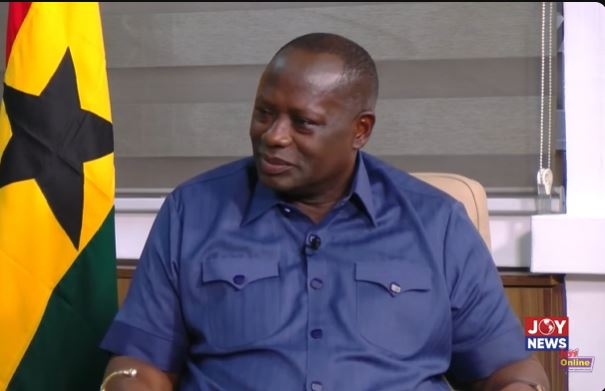Lands Minister Emmanuel Armah Kofi Buah has announced a major shift in the mining license approval process, stating that communities affected by mining activities will now play a critical role in determining whether a license is granted.
Speaking on Joy News’ PM Express on Wednesday, March 19, the Ellembelle MP made it clear that the days of mining licenses being granted through an opaque bureaucratic system are over.
"All the players that make up DISEC will now be co-opted into the licensing process," Mr Kofi Buah stated.
"This means that DISEC, the Environmental Protection Agency (EPA), the Minerals Commission, the Forestry Commission—if needed—the Water Resources Commission, and, importantly, the traditional authorities in the area will all have a say."
He explained that under the previous system, approvals were given in isolation by separate agencies.
"In the past, we had bosses of approval. The Water Resources Commission, for example, would approve a license to say that, yes, this is not close to a water body.
The EPA would approve, and then the Minerals Commission would approve. But what we are doing now is different. We are creating a true one-stop shop, where all stakeholders—including the local communities—are involved from the beginning."
Buah emphasised that the final decision will no longer rest solely with the minister or government agencies.
"This time, that one-stop shop includes the communities that are going to be impacted. The communities will also approve the recommendation, confirming that the concession is not close to a water body or a forest reserve and that they support it."
The minister stressed that without community endorsement, no mining license would be granted. "It is only on that basis that the minister sitting in Accra will sign and approve a small-scale mining license," he stated.
In addition to giving communities a voice, Buah outlined a new layer of accountability for local government officials.
"Once a license is issued, the District Chief Executive (DCE) in DISEC is completely responsible for ensuring that the guidelines and conditions of the license are strictly adhered to.
"The President has already agreed on key performance indicators (KPIs) for every DCE, which will include making sure the licensing regime is properly enforced. The DCE and their team are going to be held completely accountable."
The move is seen as a response to longstanding concerns over illegal mining, environmental destruction, and the marginalisation of local communities in mining decisions.
By ensuring that mining approvals are no longer dictated solely by bureaucratic processes but by local consent, the government aims to create a more transparent and responsible approach to resource management.
Latest Stories
-
WAFCON 2024: Four Black Queens players to watch at continental showpiece
21 minutes -
Kuami Eugene names favourite Ghanaian actors, bemoans absence of Ghanaian films on streaming platforms
22 minutes -
Asante Kotoko pay tribute to deceased Liverpool star Diogo Jota
23 minutes -
NPP rejects Ablekuma North re-run; vows to challenge case in court
35 minutes -
Once upon a time in Ghana
37 minutes -
TEWU declares strike over union representation in public universities
55 minutes -
Ghana to host 2025 Global Entrepreneurship Festival – Samuel George
56 minutes -
Ghanaian teenager Emmanuel Boansi wins Georgian Super Cup
1 hour -
Sean ‘Diddy’ Combs’ Conviction Exposes Ghana’s Fame Illusion and Power Exploitation
1 hour -
Ghanaian musicians must take discipline seriously – BigShot Band GH
1 hour -
Agradaa convicted of fraud, awaits sentencing after pregnancy test
1 hour -
Trial date set for former NSB boss Kwabena Adu-Boahene over GH¢49m cybersecurity saga
1 hour -
15% VAT on Non-Life Insurance Premium not a new tax – GRA clarifies
1 hour -
Photos from the state banquet in honour of Indian Prime Minister Narendra Modi
2 hours -
Energy Minister swears in reconstituted GNPC Board
2 hours

